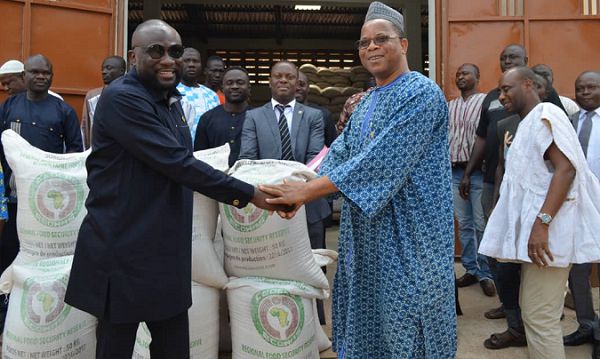
Govt, ECOWAS sign agreement for grains
The Economic Community of West African States (ECOWAS) and the Government of Ghana have signed an agreement under which Ghana has agreed to take delivery of 2,750 metric tonnes of cereals to use under its school feeding programme.
The ECOWAS Commissioner for Agriculture, Environment and Water Resources, Mr Sekou Sangare and the Chief Executive Officer of the NAFCO, Alhaji Hanan Abdul-Wahab signed for ECOWAS and the Government of Ghana respectively.
Storage
Under the agreement, Ghana would use the grains, which ECOWAS had stored in the ware houses of the National Food Buffer Stuck Company (NAFCO) in Tamale and Yendi in the Northern Region.
The cereals, which are not for free but to be replenished by March 2019, comprise 1,000 tonnes of maize, 750 tonnes of white rice, 500 tonnes of millet and 500 tonnes of sorghum.
Why the agreement
The agreement follows a request from ECOWAS for public notice of sale of the 2,750 metric tonnes of the cereals of which NAFCO officially communicated the interest in the use of the consignment to feed the beneficiary public boarding second cycle schools under the government Free SHS policy.
Graphic Online Severious Kale-Dery who was at the ceremony reports that in a brief statement after the signing, Mr Sagare explaining that the handover “is the expression of the regional solidarity, meaning the solidarity of the other 14 ECOWAS member countries to Ghana through the Regional Food Security Reserve created in 2013 by the Heads of State and Government of the ECOWAS member countries.”
Connecting farmers
He said the ECOWAS Commission was happy to promote the role of the Regional Food Security Reserve as a strategic instrument of connecting farmers to all institutional markets in the member countries, including the school canteen markets.
“We sincerely hope that the process of supporting school canteen programmes in Ghana will become more consolidated, that it will quickly diversify to take over the food supply of all Ghanaian cities and gradually extend to all ECOWAS member countries as well,” Mr Sagare said.
Response
Responding, Alhaji Abdul-Wahab said 2,250 metric tonnes of the grains would be used under the school feeding programme, while the remaining 500 metric tonnes of sorghum would be sold to the public.
“It is the expectation of the NAFCO to strengthen its bilateral relationship with the ECOWAS Regional agency for food and agriculture, as the company positions itself for an increase4d warehousing capacity that meets the standards of ECOWAS,” he said.
Alhaji Abdul-Wahab, who in turn, handed over the agreement to the Deputy Minister of Food and Agriculture in charge of Annual Crops Dr Sagre Bambangi, said the consignment was stored last year and ECOWAS needed to handover to government so that government could replace with fresh grains.
“It is therefore not for free but the grains will be replaced grains for grains,” he explained and was confident that with the government’s flagship programme of Planting for Food and Jobs, “we will not have any problem replacing the grains.”
He said it was a favour Ghana was rendering to ECOWAS to take the old grains to be replaced with fresh ones as an expression of solidarity with the ECOWAS.
